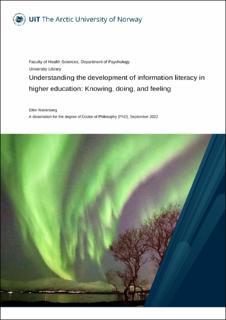| dc.description.abstract | English abstract:
Information literacy (IL) is the ability to recognize when information is needed and to find, evaluate, and effectively use this information. The aim of this doctoral research was to study the development of IL in undergraduates over three years, including their knowledge, skills, and attitudes, and the relationships among the three. Mixed methods were employed to better understand the totality of students’ IL development, and this research demonstrates the value of employing this methodology in the field of IL. Four psychometrically evaluated tools were developed to measure students’ IL knowledge, skills, and attitudes: a 21-item IL test (knowing); two authentic assignments to assess skills in evaluating and using information sources (doing); and a questionnaire to measure students’ interest in being or becoming information literate (feeling). These freely available IL-assessment tools contribute to both IL research and practice. The interest questionnaire can be employed to measure the development of other interests as well, and thereby represents a contribution also for those who study interest. This research fills gaps in the IL literature by studying interactions among several facets of IL over time. It follows IL development longer than most studies and introduces the measurement of interest – an important motivator for learning – into the field of IL. It is also the first study to explore transformative IL learning in students. Findings show that (1) IL is a multifaceted construct; (2) students’ IL knowledge and skills increase and intercorrelate more with time, as do their IL attitudes when measured by interest and IL’s usefulness and importance for them. Interviews revealed that (3) students gradually become more interested in being or becoming information literate people, and (4) some experience a change in identity as a result of becoming more information literate, which indicates that transformative IL learning can occur. | en_US |
